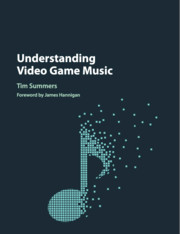Book contents
- Frontmatter
- Dedication
- Contents
- List of Figures, Musical Examples and Tables
- Foreword
- Acknowledgements
- Introduction: Beyond the Candelabrum
- PART I ANALYSING VIDEO GAME MUSIC
- PART II CRITICAL PERSPECTIVES
- 3 Texturing and the Aesthetics of Immersion
- 4 Music and Virtual Game Worlds
- 5 Communication for Play
- 6 Hollywood Film Music and Game Music
- 7 Musical Play and Video Games
- Epilogue: Fun, Play and Music
- Appendix: How to Hear a Video Game: An Outline
- Bibliography
- Ludography
- Index of Games
- General Index
4 - Music and Virtual Game Worlds
from PART II - CRITICAL PERSPECTIVES
Published online by Cambridge University Press: 05 September 2016
- Frontmatter
- Dedication
- Contents
- List of Figures, Musical Examples and Tables
- Foreword
- Acknowledgements
- Introduction: Beyond the Candelabrum
- PART I ANALYSING VIDEO GAME MUSIC
- PART II CRITICAL PERSPECTIVES
- 3 Texturing and the Aesthetics of Immersion
- 4 Music and Virtual Game Worlds
- 5 Communication for Play
- 6 Hollywood Film Music and Game Music
- 7 Musical Play and Video Games
- Epilogue: Fun, Play and Music
- Appendix: How to Hear a Video Game: An Outline
- Bibliography
- Ludography
- Index of Games
- General Index
Summary
I am not a murderer. At least, I do not think that I am a murderer. After all, video games are not the same as real life. When I shoot an enemy henchman in Tomb Raider II (1997), no-one actually dies. There is no funeral for the dedicated employee, no sympathy cards are written and no-one reminisces with humorous anecdotes about the good times had in the sparkling company of ‘Goon A’. I am not responsible for a death, I do not have to stand trial and justify my self-defence, because my name is not Lara Croft and the enemy is fictional. My murderous actions are not real.
But, as game theorist Jesper Juul found out, once we start to investigate games in detail, the boundary between the ‘real’ and ‘not real’ becomes a little more difficult to determine. Evidently, games are real things that exist in the world. Winning a game is also a real event. Juul concludes that the rules that serve as parameters of the game are real, though they are invented and virtual. Physical manifestation is not a criterion for being real – ideas and prejudices are real, even if they are not concretely incarnate. T.L. Taylor has described how real cultures can be created and real friendships forged inside multiplayer online video games. Such games blur together offline and online ‘spheres’, since ‘[w]hat happens in virtual worlds often is just as real, just as meaningful to participants’ as experiences outside them. Rather than considering the rules of a game (the mechanics of gameplay, such as how players win the game and the modes of interaction) and the fiction of the game (the worlds and stories presented by the game) as separate, Juul emphasizes the link between rules and fictions, not least because it is through the fictions that the player comes to understand the rules of the game:
A game cues a player into imagining a fictional world. Games can do this in a number of different ways: using graphics, sound, text, cut-scenes, the game title, box, or manual, haptics, and rules … [T]he representation and fictional world presented by the game cue the player into making assumptions about the rules of the game.
- Type
- Chapter
- Information
- Understanding Video Game Music , pp. 85 - 115Publisher: Cambridge University PressPrint publication year: 2016



